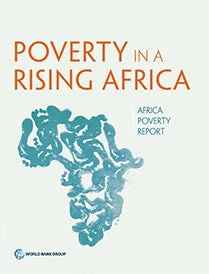
At the same time, for every five adults, two remain illiterate, life expectancy still only stands at 57— 10 years less than in South Asia – and the number of violent events has been on the rise again since 2010. The human development challenge remains substantial. Moreover, despite being a major force behind Africa’s growth renaissance, citizens in resource-rich countries did not experience a commensurate jump in their education or health status. On the contrary, results from the World Bank’s recent Africa Poverty Report “Poverty in a Rising Africa,” suggest that it is especially resource-rich countries which are bad at converting their economic fortunes into better human development.
Added to the recent collapse of commodity prices, this makes Africa’s human development challenge even more intractable. With almost all African countries now exploiting natural resources, how to better deploy Africa’s resource riches to boost its human capital, must pre-occupy all involved. It would help to build a more diversified and sustainable growth path, and distribute the natural resource wealth across generations.
A human development penalty
The comparative loss for citizens of resource-rich countries in terms of health and education outcomes is indeed substantial. Systematic analysis of the available data suggests that conditional on the country’s level of development, as well as other household characteristics, citizens in resource-rich countries are less literate (by 3.1 percentage points), have shorter life expectancy (by 4.5 years), are more malnourished (by 3.7 percentage points among women and by 2.1 percentage points among children under five) and women suffer more from domestic violence (by nine percentage points) (Figure 1). In short, they suffer from an unacceptable human development penalty. It also points to much untapped potential.
Figure 1: Human development penalty to residing in resource rich countries
Source: Beegle, Christiaensen, Dabalen, and Gaddis, 2016
Both low spending (relatively speaking) and efficiency underpin the lower outcomes. In cash terms, public spending on both education and health tends to be higher in Africa’s resource-rich countries. As a share of gross domestic product (GDP), however, it is 20 to 40% lower than in non-resource-rich countries. Moreover, despite higher spending in cash, they have little to show for it: grade six completion is not higher, and infant mortality rates are not lower, indicating low effectiveness of spending.
Some of the poor performance can be linked to the features of natural resource income flows. First, instead of being taxed away, natural resource revenues are rents, or unearned income, undermining incentives for accountability and prudent spending. Second, given volatility in commodity prices, they can fluctuate substantially, making budget planning difficult. Third, inflows can be large (and sudden), testing governments’ absorption capacity. Together, these features often lead to poor governance.
Nonetheless, these challenges can be overcome, as Botswana, Chile and Malaysia, for example, have shown. It requires proper institutional arrangements (laws) to govern the resource flows, performance incentives for public service providers (e.g. through result based financing) and open access to information and transparency to foster social accountability; one example is by joining campaigns such as the Extractive Industry Transparency Initiative (EITI). Transferring part of the resource rents directly as cash to the population can be also be a powerful instrument. With citizens now directly vested in knowing the resource flows and credit and insurance constraints relaxed, it stimulates demand for accountability and social services.
Yet, as highlighted in the forthcoming World Bank’s regional study “From Mines to Mind” by de la Brière et al (2016), getting things right takes time, while time is running out. Without making smarter use of its vast resource wealth to boost its human capital, it is hard to conceive how Africa can broker its structural transformation necessary to productively employ its rapidly expanding youth. This will require leadership and bold choices.
Could the recent collapse in commodity prices in fact not provide the opportune environment to shift gears and tackle the challenge? We have yet to see.
This blog is part of a series reflecting on the findings of the 2016 World Bank Report “Poverty in a Rising Africa." Next in the series: illiteracy in Africa on February 29, 2016. Previous blogs in the series include:
- Africa is rising! But are people better off?
- Who will fund poverty surveys in Volkswagen countries?
- The European refugee crisis: What we can learn from refugees in Sub-Saharan Africa
- Poverty is falling faster for female-headed households in Africa
- The shock of widowhood: Marital status and poverty within Africa
- Domestic Violence and Poverty in Africa: When a Husband’s Beating Stick is Like Butter
- Data gaps: The poor typical household survey’s miss
- Inequality of opportunity in Sub-Saharan Africa
- Is inequality in Africa rising?
- Education for all in a “rising Africa”



Join the Conversation